|
Parts of a Circle and Formulas
For angles in circles formed from tangents, secants, radii and chords click here.

|
Here are the procedures by which the Circle Calculator
determines all of a circle's data from just 2 variables.
Intersecting Chord Theorem
A great time-saver for these calculations is a little-known geometric theorem
which states that whenever 2 chords (in this case AB and CD)
of a circle intersect at a point E, then AE • EB = CE • ED
Yes, it turns out that "chord" CD is also the circle's diameter and the 2
chords meet at right angles but neither is required for the theorem to hold true.
|
| |
1) Radius and Central Angle
We know the central angle is AOB and so angle AOE = ½ central angle
From trigonometry we know that the sine of angle AOE = AE/AO
So, line AE = sine of angle AOE • line AO
Using the Pythagorean Theorem line OE² = AO² - AE²
Segment Height ED = Radius AO - Apothem OE
2) Radius AO & Chord AB
AE = ½AB
From the Pythagorean Theorem
OE² = AO² - AE²
Segment Height ED = Radius AO - Apothem OE
Angle AOE = arc tangent (AE/OE)
Central Angle AOB = 2 • Angle AOE
3) Radius AO & Segment Height ED
Apothem OE = Radius AO - Segment Height ED
Angle AOE = arc tangent (AE/OE)
Central Angle AOB = 2 • Angle AOE
4) Radius AO & Apothem OE
Segment Height ED = Radius AO -Apothem OE
Angle AOE = arc tangent (AE/OE)
Central Angle AOB = 2 • Angle AOE
5) Radius AO & Arc AB
Circumference = 2 • π • radius AO
Central Angle AOB = (Arc AB / Circumference) • 360
Angle AOE = Central Angle AOB / 2
Chord AB = 2 • sine (Angle AOE) • radius
6) Chord AB & Segment Height ED
This is where the "intersecting chord theorem" really comes in handy.
CE • ED = AE • EB
CE = (AE • EB) / ED
Since AE = EB = ½AB then:
CE= (½AB • ½AB) / ED
CE = AB² / 4•ED
Radius AO = (CE + ED) / 2
Apothem OE = Radius AO - Segment Height ED
Angle AOE = arc tangent (AE/OE)
Central Angle AOB = 2 • Angle AOE
7) Chord AB & Apothem OE
AE = ½AB
From the Pythagorean Theorem
Radius AO² = OE² + AE²
Segment ED = Radius AO - Apothem OE
Angle AOE = arc tangent (AE/OE)
Central Angle AOB = 2 • Angle AOE
8) Segment Height ED & Apothem OE
Radius AO = Segment Height ED + Apothem OE
Angle AOE = arc tangent (AE/OE)
Central Angle AOB = 2 • Angle AOE
From the Pythagorean Theorem
AE² = AO² - OE²
Chord AB = 2 • AE
9) Chord AB & Arc Length AB (curved blue line)
There is no formula that can solve for the other parts of a circle if you only know the chord and the arc length.
There is a procedure called Newton's Method which can produce an answer. To try it, click the link here and then scroll about ¾ of the way down to "A Real World Example" where we have a worked out example.
Return To The Circle Calculator
_____________________
Return To Home Page
Copyright © 1999 -
|
|

